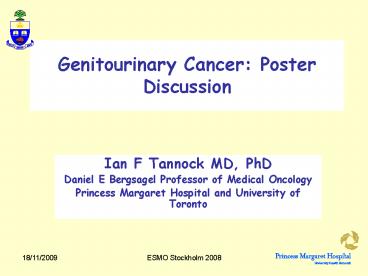Genitourinary Cancer: Poster Discussion - PowerPoint PPT Presentation
1 / 9
Title:
Genitourinary Cancer: Poster Discussion
Description:
... initial chemotherapy in patients with Castrate-Resistant Prostate Cancer (CRPC) ... phase II study of weekly patupilone in men with CRPC showed PSA response in 25 ... – PowerPoint PPT presentation
Number of Views:86
Avg rating:3.0/5.0
Title: Genitourinary Cancer: Poster Discussion
1
Genitourinary Cancer Poster Discussion
- Ian F Tannock MD, PhD
- Daniel E Bergsagel Professor of Medical Oncology
- Princess Margaret Hospital and University of
Toronto
2
Potential conflicts of interest
- I have no financial conflicts of interest
- I and my colleagues entered patients in the
randomised trial comparing sutinib with
interferon-?
3
Prostate Cancer
- K. Chi et al (CUOG), Vancouver, Canada
- A phase 2 study of patupilone in patients with
metastatic hormone refractory prostate cancer who
have progressed after docetaxel
4
Background and Rationale
- Docetaxel is usual initial chemotherapy in
patients with Castrate-Resistant Prostate Cancer
(CRPC) - No effective 2nd line treatment.
- Patupilone (Epothilone B) is a microtubule
targeting agent, which is active agianst a broad
spectrum of cell lines in vitro and in vivo - A prior phase II study of weekly patupilone in
men with CRPC showed PSA response in 25, some
after taxane-based chemotherapy - This phase II study evaluates 3-weekly patupilone
in men with metastatic CRPC who had progressed
after docetaxel
5
Study Design
1o Endpoint
Stage I
- CRPC
- Progression while on or within 6 months of
docetaxel
Patupilone 10 mg/m2 (first 6 pts) and 8 mg/m2
(pts 7)
Accrue 43 evaluable patients if gt6 responses
open Stage II
- PSA response
- 50 decline from baseline, confirmed 3 weeks
Stage II
2o Endpoints
After 6 responses
- Response ratio/duration
- Time to progression
- Time to treatment failure
- Overall survival
- Pain intensity index and analgesic score
- Safety and tolerability
Accrue 28 additional patients if gt14 responses
further studies warranted
6
Adverse Events
- Four first-cycle serious GI adverse events
(diarrhea, dehydration, ileus) occurred in the
first 6 patients who received 10 mg/m2 - Initial dose then lowered to 8 mg/m2 with
improved tolerability - No Grade 3 or 4 hematologic adverse events
- Fatigue, diarrhea and anorexia remained most
frequent grade 3 events
7
Efficacy Summary
- 70 patients evaluable for PSA response
- Preliminary assessments shows 50 decline in PSA
in 31/70 (44) patients - Confirmed PSA response in 22/70 (31) patients
- Of 59 patients eligible for analysis 32 (54) had
a pain response (defined as a 2 point decrease or
disappearance of pain on a 6 point scale) - Too early to comment on Time to Progression or
survival
8
Waterfall Plot of PSA Decline
9
My Comments
- Patupilone is active but has substantial GI
toxicity - Epothilones are neurotoxic and perhaps not ideal
agents for use after docetaxel - A randomised phase 2 study of another epothilone
(ixabepilone) showed similar PSA response rates
to mitoxantrone (17 20) in men who had prior
taxane (Rosenberg et al Cancer 2007110556-63) - A planned phase 3 trial of ixabepilone was
abandoned. - I have limited enthusiasm for a phase 3 second-
line study of patupilone































